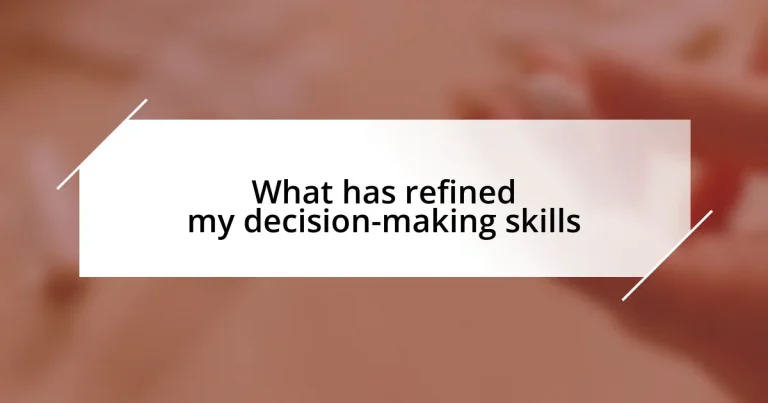Key takeaways:
- Effective decision-making blends logic with intuition, influenced by values and past experiences.
- Mindfulness enhances decision-making by helping to separate emotional responses from critical choices.
- Seeking feedback from trusted sources enriches understanding and informs more robust decisions.
- Implementing decisions successfully requires clear communication, adaptability, and celebration of small wins.
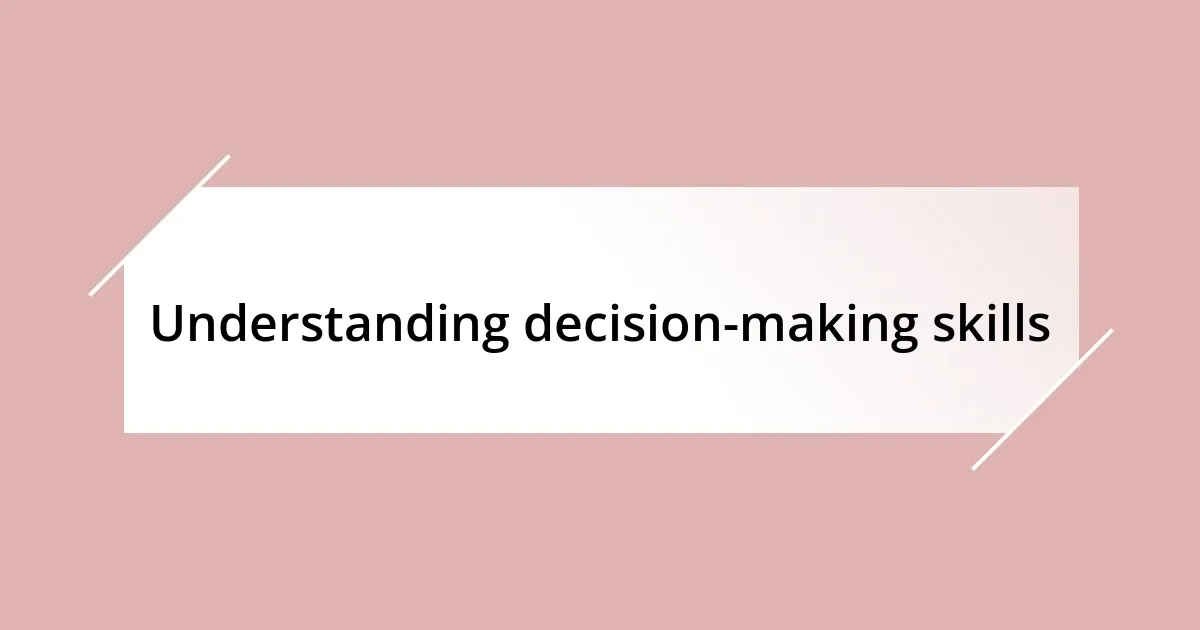
Understanding decision-making skills
Understanding decision-making skills is fundamental to navigating life’s complexities. I remember a time when I had to choose between accepting a job offer that paid well but required extensive travel and staying in a role I loved for less pay. It struck me how deeply our values influence decisions; in that moment, I had to reflect on what mattered more to me: stability or opportunity.
As I analyzed my decision, I realized that effective decision-making combines logic and intuition. Have you ever experienced a gut feeling that guided you towards the right choice? For me, it often feels like an internal compass directing me, yet acknowledging this instinct takes practice. The more I learned about my patterns, the more confident I became.
Our choices often echo in our lives long after we’ve made them. I’ve faced moments of regret, and while they were painful, they taught me invaluable lessons about weighing options and the importance of foresight. Ultimately, I’ve learned to approach decisions as opportunities for growth; each one is a stepping stone towards becoming a better version of myself.
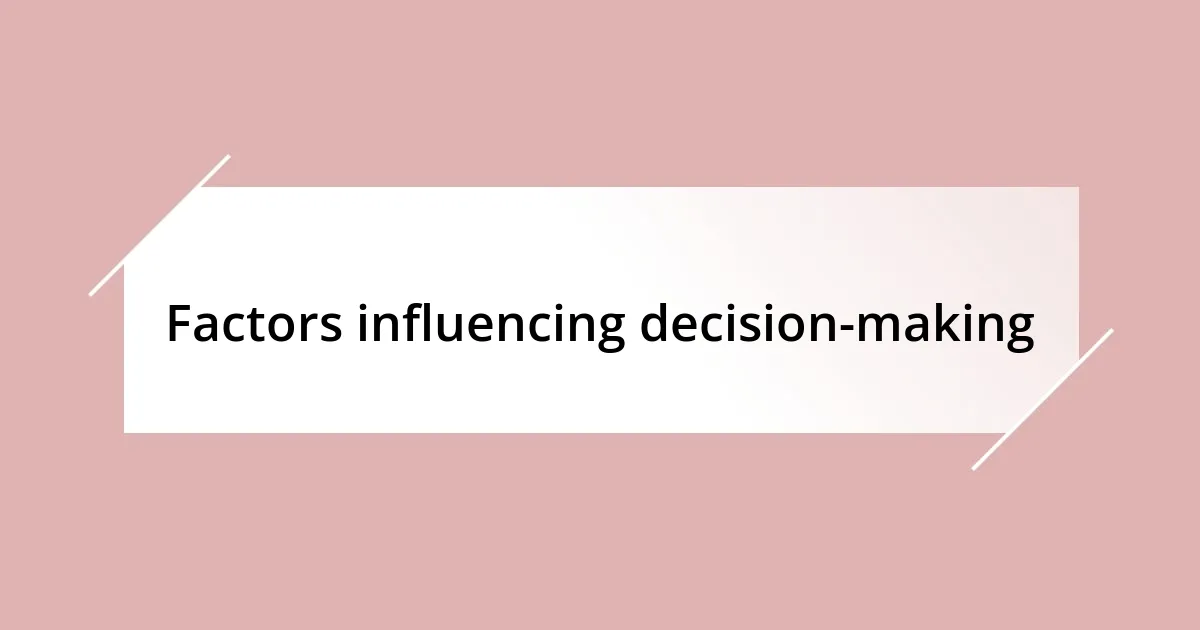
Factors influencing decision-making
When I think about what shapes my decision-making, I often notice the influence of past experiences. For instance, after a challenging breakup, I struggled with deciding to trust again. That choice made me realize how emotions can cloud judgment; it’s easy to let fear dictate my actions, but I learned that vulnerability can lead to more authentic connections and understanding.
Another factor I’ve encountered is social influences. Whether it’s my friends, family, or even cultural expectations, outside opinions can significantly sway what I decide. I once refrained from pursuing a career change because I worried about what others would think. Looking back, I can see how aligning my choices with my own values, rather than succumbing to external pressures, has forged a stronger path for my personal growth.
Finally, time is a crucial player in decision-making. There were instances when rushing a choice led to regret. One time, I had a limited window to accept a job, and I hastily said yes without fully considering the ramifications. Reflecting on that now, I understand the importance of giving myself the space to think critically. Allowing time to process can unveil perspectives I might have overlooked initially.
| Factor | Impact on Decision-Making |
|---|---|
| Emotional state | Can cloud judgment, influencing choices based on fear or vulnerability. |
| Social influences | Often leads to aligning decisions with group expectations rather than personal values. |
| Time | Rushed decisions may result in regret; allowing time fosters critical thinking. |
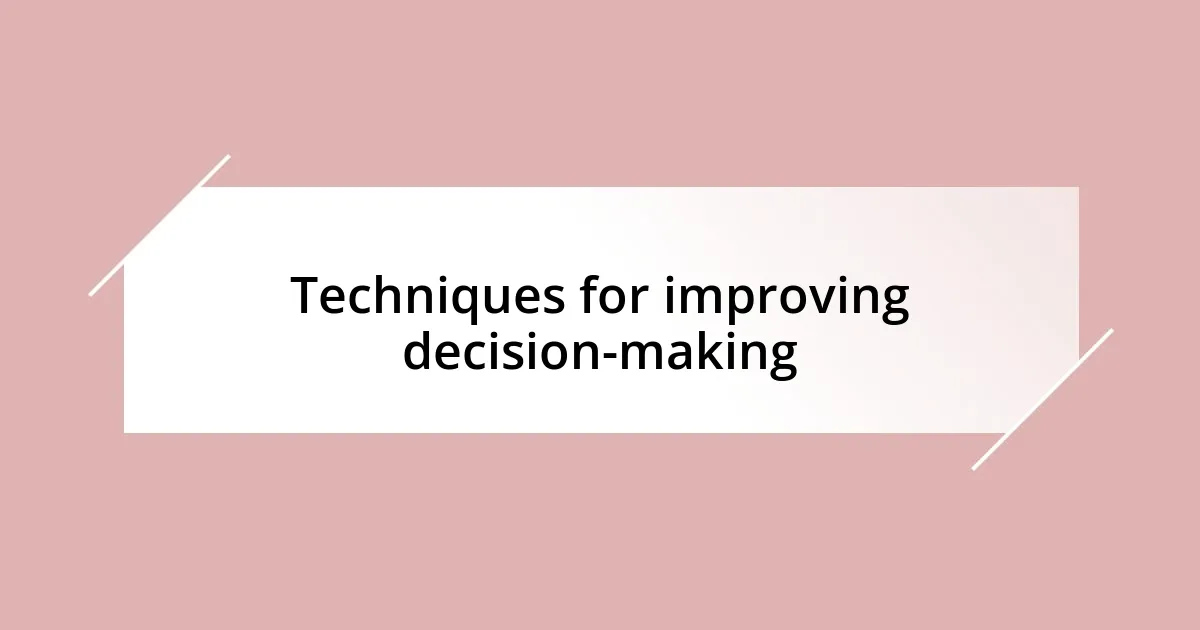
Techniques for improving decision-making
Improving decision-making is a continuous journey for me, and I’ve found that adopting specific techniques can truly enhance the clarity of my choices. One method I frequently employ is the “pros and cons” list. By laying out the advantages and disadvantages in front of me, I can better visualize the outcomes. I recall a time when I was torn between two job offers; breaking it down on paper helped me see which fit my goals better.
Here are some valuable techniques I’ve integrated into my decision-making process:
- Mind Mapping: Visualizing my thoughts helps me understand the relationships between different options.
- Setting a Time Limit: Giving myself a specific timeframe to decide reduces the pressure and helps to avoid being overwhelmed by the possibilities.
- Seeking Input: Discussing my choices with trusted friends or mentors can provide new perspectives I might not have considered.
- Meditation: Taking a moment to quiet my mind can bring clarity and help me tune into my instincts.
- Reflecting on Past Choices: Regularly reviewing decisions I’ve made allows me to learn from both successes and mistakes.
I also appreciate the importance of gut feelings. Early in my career, I faced a critical choice: relocate for a promotion or stay in a place I loved. My instincts were at odds with what social norms suggested. Ultimately, I chose to listen to my intuition; it was a pivotal decision that taught me the value of trusting myself, even when the practical reasons seemed compelling. This deepened my understanding that, while techniques are helpful, personal values and emotions play a fundamental role in the process.
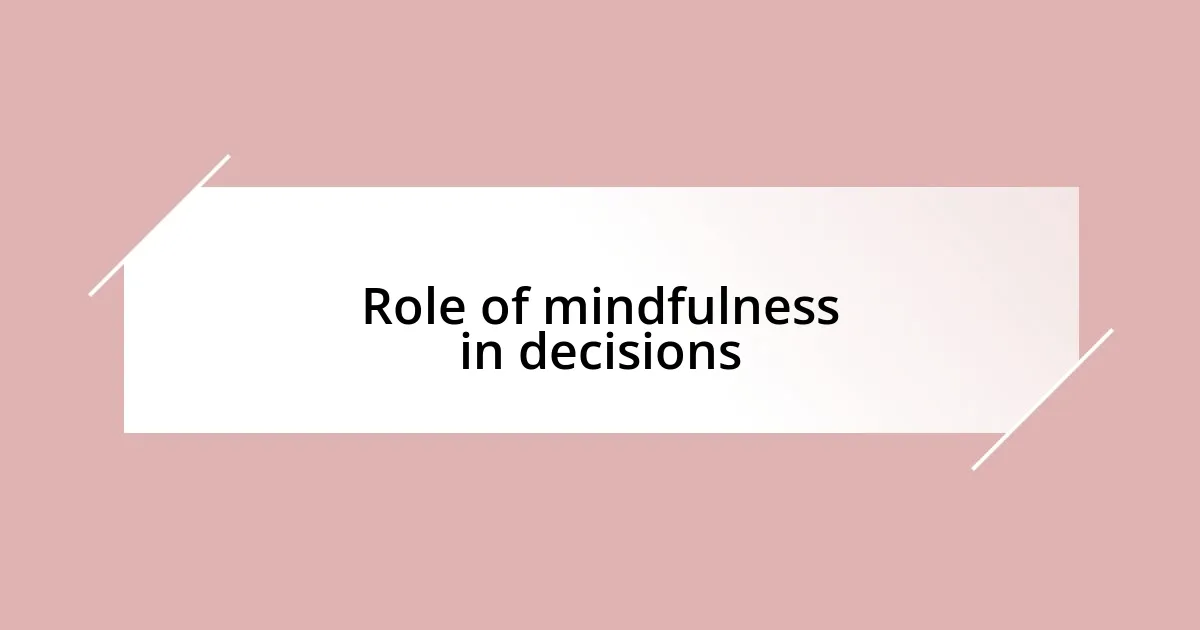
Role of mindfulness in decisions
Mindfulness has become a cornerstone in my decision-making toolkit. In moments of uncertainty, I find that simply taking a breath and grounding myself helps clear away the static of overwhelming thoughts. For example, during a recent project at work that had many moving parts, I realized how crucial it was to remain present rather than letting anxiety about the outcome cloud my judgment. By focusing on the task at hand, I could make more thoughtful choices that aligned with my objectives.
Practicing mindfulness allows me to separate my immediate emotional responses from the decisions I need to make. I recall a time when I encountered a conflict with a colleague that stirred frustration within me. Rather than reacting impulsively, I took a few minutes to meditate before addressing the issue. This brief pause transformed my approach from confrontation to collaboration, demonstrating how being mindful helps in recognizing the emotional triggers that influence my decisions.
I often wonder—how many decisions do we make on autopilot? When I consciously engage in mindfulness, I notice I’m more aware of both my internal dialogue and the external factors at play. This awareness not only enhances my capacity to make sound choices but also fosters a sense of control in situations that might otherwise feel chaotic. Embracing mindfulness has significantly refined my decision-making, allowing me to be more intentional with each choice I make.
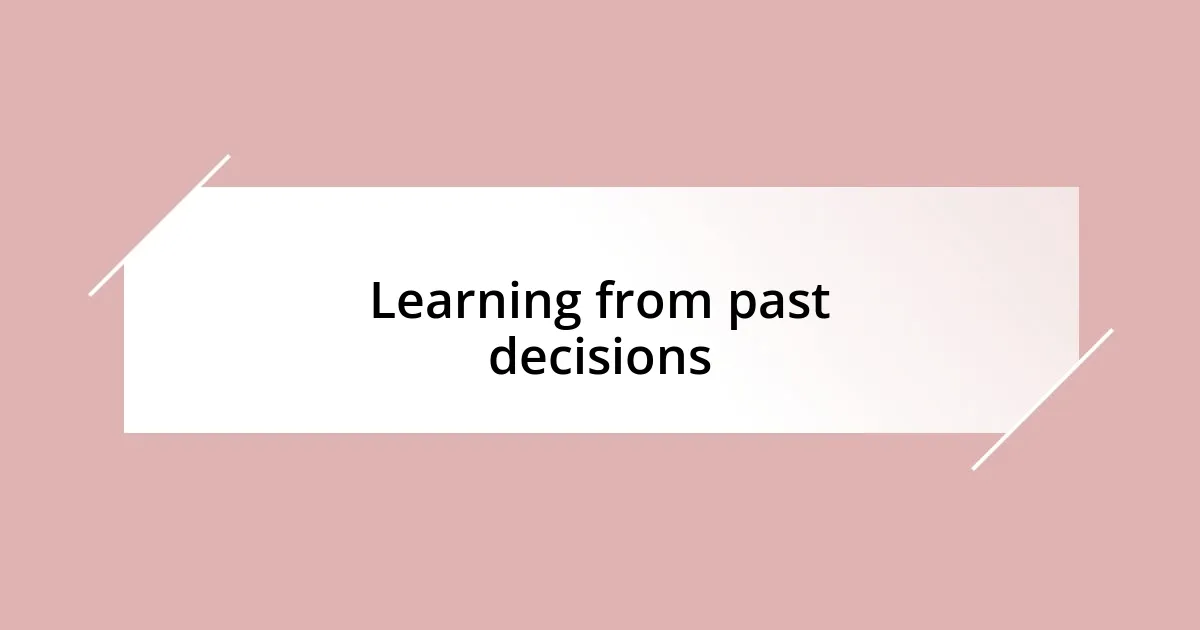
Learning from past decisions
Reflecting on past decisions is a powerful tool in honing my judgment. I remember a time when I chose to invest in a property that seemed promising but ultimately fell short due to unforeseen circumstances. Looking back, if I’d taken the time to analyze my research more thoroughly and sought expert opinions, I might have steered clear of that financial pitfall. This experience taught me that reviewing past outcomes can illuminate patterns and help avoid repeating mistakes.
In another instance, I once turned down an opportunity to lead a project because I felt overwhelmed by my existing workload. A year later, I realized how that decision limited my professional growth. Examining that moment made me question whether I often let fear dictate my choices. It highlighted the importance of challenging my assumptions about what I can handle, broadening my perspective for future decisions.
Learning from the past doesn’t just mean analyzing outcomes; it also involves understanding the emotional context. I often find myself asking—what was I feeling at the time? This added layer deepens my insights. For example, after a particularly challenging decision regarding my career path, I felt a mix of excitement and trepidation. Acknowledging that emotional complexity guides my future decisions, reminding me to embrace both my aspirations and fears as part of the journey forward.
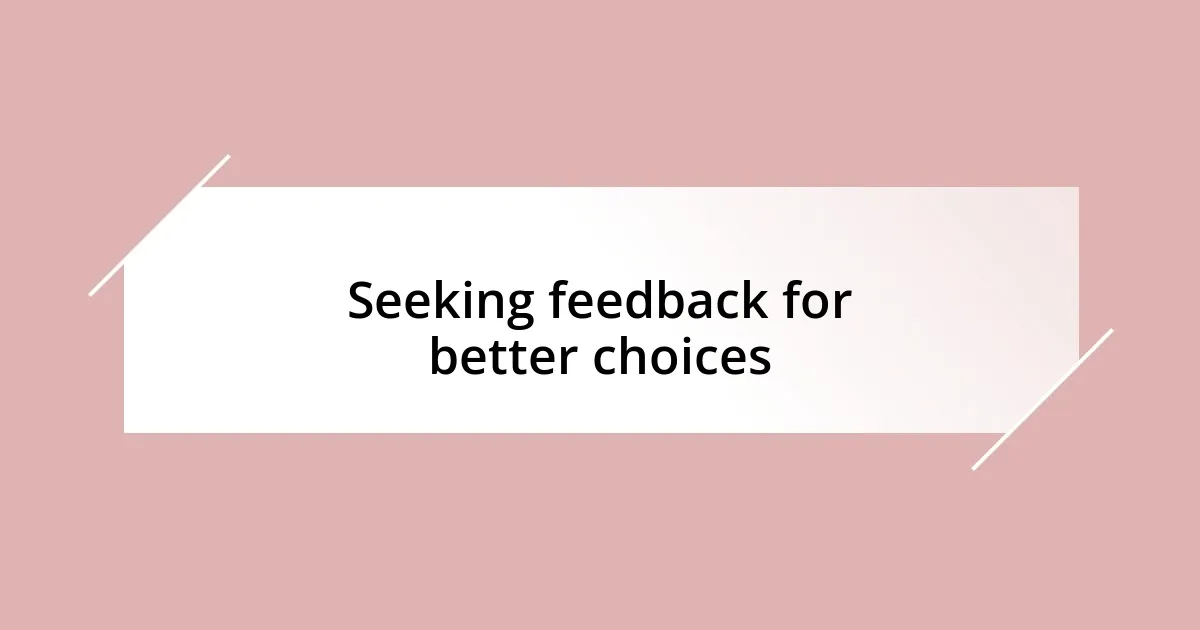
Seeking feedback for better choices
Seeking feedback has been a game-changer in refining my decision-making skills. Recently, I was faced with a significant choice about changing my career path. Instead of going it alone, I reached out to trusted colleagues and mentors. Their insights not only provided different perspectives but also highlighted considerations I hadn’t thought of. It made me realize—how often do we overlook the value of others’ experiences just because we want to figure things out on our own?
One particular experience stands out. I was deciding on whether to implement a new system at work that promised better efficiency. After sharing my ideas with a few peers, their candid feedback pointed out potential pitfalls I hadn’t considered. They asked probing questions that helped me see both sides of the decision. It left me wondering—could I have made that choice without their input? The clear answer was no; their perspectives enriched my understanding and ultimately led to a more informed decision.
Feedback doesn’t have to come solely from colleagues either. I’ve turned to friends outside of my professional bubble who bring a fresh outlook, and it often yields surprising insights. For instance, when I debated accepting a leadership role, my friend pointed out how this could align with my long-term goals. It hit me then—am I missing opportunities because I’m too focused on my immediate challenges? Seeking feedback transforms decision-making into a collaborative process, making my choices more robust and aligned with my true aspirations.
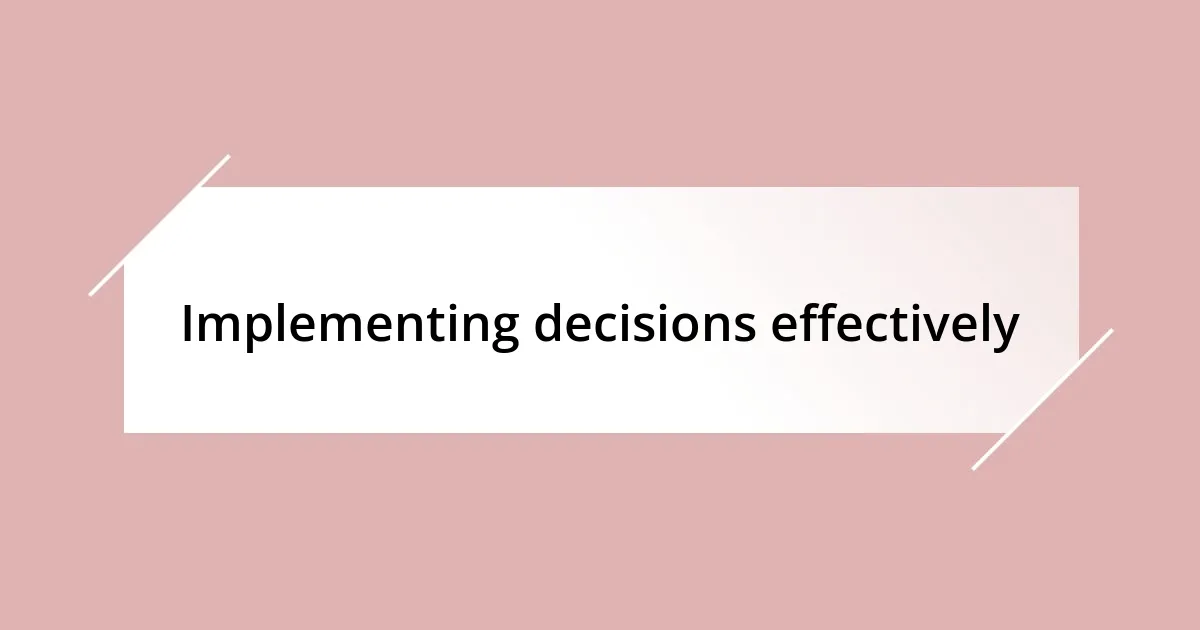
Implementing decisions effectively
Implementing decisions effectively often begins with a clear plan of action. I remember when I decided to overhaul a marketing strategy at work. I crafted a detailed timeline and assigned specific tasks to team members, making sure everyone understood their roles. It felt empowering to see everyone rally behind the common goal. But I discovered that clear communication was key; without it, even the best-laid plans can falter. Have you ever experienced a project derailing simply because expectations weren’t set? It’s a reality I know all too well.
Another lesson I learned during implementation is the importance of adaptability. After rolling out my new strategy, the initial results were mixed, which was disheartening. Instead of sticking rigidly to my plan, I encouraged open dialogues within the team about what wasn’t working. This approach not only fostered a culture of honesty but also led to innovative tweaks that improved our results significantly. I can’t help but think—how often do we cling to a method just because we’re attached to it? Flexibility can be a powerful ally in navigating the unpredictable landscape of decision-making.
Finally, I’ve realized that celebrating small wins fosters momentum. When we achieved early successes in our strategy implementation, I made it a point to acknowledge and celebrate them. This practice infused a sense of purpose and motivation within the team, reinforcing the belief that we were on the right path. Reflecting on those moments, I can’t stress enough how recognizing progress can make a daunting project feel more manageable. Have you ever neglected to celebrate a small victory? It’s a simple yet profound way to boost morale and keep everyone engaged.












